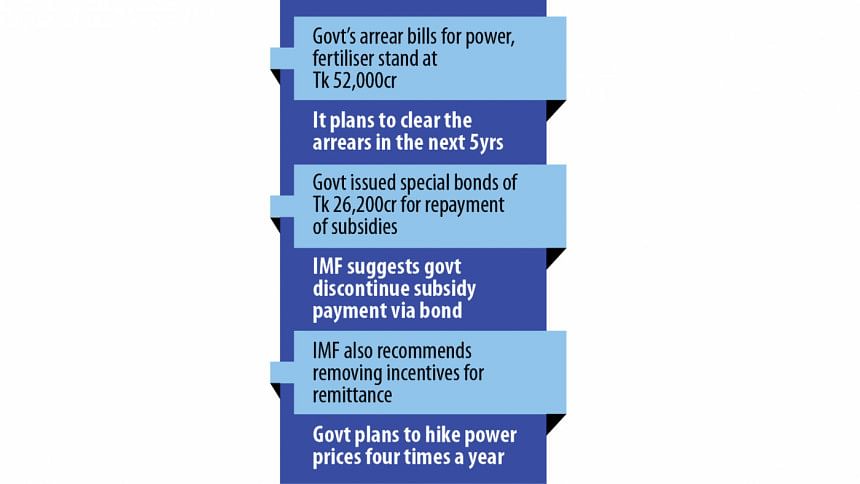IMF charts path out of farm subsidy

The International Monetary Fund has suggested an alternative to reducing agricultural subsidies -- raising fertiliser prices and providing cash or vouchers for certain farm inputs to support poor farmers.
The global lender also recommended removing incentives for remittance and gradually reducing subsidy on electricity.
The IMF made the suggestions in its programme document as the lender approved $1.15 billion in the third tranche of the $4.7 billion loan to Bangladesh on Monday.
The government has assured the IMF of progressively reducing the subsidy on power by hiking the prices four times a year, but it did not say anything about cutting or withdrawing the subsidies on remittance and agriculture.
"Increases in fertiliser prices could be coupled with cash transfers or vouchers for a range of agricultural inputs (including fertiliser) targeted at small or poor farmers," the IMF said.
It said several options can be considered to lessen the fertiliser subsidy bill.
Raising domestic production of fertiliser by increasing the natural gas supply to existing fertiliser factories could also help cut the reliance on expensive imports. The impact of a reduction in gas supply to other sectors would need to be carefully considered, the IMF said.
In April 2023, the World Bank provided Bangladesh $500 million for agricultural and rural transformation. With the funding, the government will build a comprehensive database of farmers and experiment with e-vouchers for fertilisers and other agricultural inputs.
The IMF said the new database and the findings are expected to yield valuable information that the authorities can use for a rethink of the agricultural subsidy system and put current budget allocations for fertiliser subsidies to more productive uses.
It said the current fixed price system -- under which farmers purchase fertiliser at a set price irrespective of quantity procured or farmer characteristics -- provides a universal and untargeted subsidy that favours the use of fertiliser over other agricultural inputs.
"As a result, farmers may overuse fertilisers while underinvesting in other inputs such as high-yielding seed varieties and precision irrigation systems."
Better agricultural extension services could help lower dependence on fertilisers and achieve the same agricultural output with a smaller amount of fertiliser inputs, the global lender said.
A sharp rise in global prices of these commodities since 2021 has led to a significant increase in subsidy claims in recent years. This is concentrated in the electricity and agricultural sectors, where domestic price adjustments have failed to keep pace with the rise in costs, according to the IMF.
Whereas natural gas and fuel prices were raised broadly in line with international prices, concerns about food security and affordability amid an already inflationary environment led the government to limit price increases on fertilisers and power, it said.
"As a result, subsidy claims by electricity and fertiliser producers and importers have risen substantially and were met in part through arrears and the issuance of special, low-interest bonds to commercial banks to offset outstanding loans to electricity and fertiliser companies."
The government allocated more than Tk 1 lakh crore for subsidies and incentives in the current fiscal year. The same amount has been allocated in the proposed budget for the next fiscal year.
As per the IMF report, the government has recognised the unsustainable nature of the current subsidy bill and signalled its intention to raise power prices in 2024 and beyond.
It said the government intends to avoid incurring new arrears and enable the gradual clearing of arrears and eventual phasing out of power subsidies over five years.
To this end, the authorities implemented a first round of increase in the retail electricity price by 4 percent in February 2024 and are expected to continue raising prices gradually with around four price adjustments per year.
"Electricity subsidies are thus expected to start declining from FY25."
The IMF said avoiding new domestic arrears and clearing arrears is crucial to safeguarding fiscal prudence.
Increased subsidy demands from independent power producers and fertiliser suppliers since FY22 have resulted in domestic arrears of Tk 52,000 crore, which is about 1 percent of the GDP.
"The issuance of special bonds to commercial banks at below-market interest rates to pay off outstanding debts of electricity and fertiliser companies in lieu of subsidy payments should be discontinued," the IMF said.
Since January, the government has issued special bonds worth Tk 26,200 crore, which is 0.5 percent of the GDP.
The bonds carry interest rates equal to the repo rate, below prevailing market rates for treasury bonds of comparable maturity (8-10 years) and can be used as collateral against liquidity facilities from the Bangladesh Bank, it said.
The repo rate is the rate at which the central bank lends money to commercial banks.
The government now provides 2.5 percent incentives for remittance.
The IMF said the recent exchange rate reforms make such an incentive for attracting inflows unnecessary.
"Consequently, the government is encouraged to reduce this subsidy below 2 percent and eliminate it eventually."


 For all latest news, follow The Daily Star's Google News channel.
For all latest news, follow The Daily Star's Google News channel. 





Comments